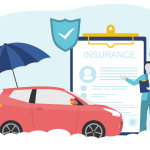9 Factors That Affect Your Auto Insurance Premiums
January 27, 2022

Looking to invest in a vehicle? You’ll need to get Auto Insurance before you can even think of hitting the road. But if you’re under the impression that every insurance company will charge you the same prices for the same benefits, we’re here to let you know that not all auto policies are created equal.

Why? Insurance companies all have different views of risk based on a variety of factors. And when you’re able to provide your insurance company with the right information, they can make sure that you have the right coverage at the right price for your needs. That way you’re not overpaying when you could be eligible for discounts or reductions, or worse, paying less and being underinsured in the event of damage or theft.
Here are 9 of the main factors that will affect your Auto Insurance rates:
1. The type of car you drive
The less statistically likely your car is to be involved in a claim, like a collision or theft, the lower your car insurance premium will be. Insurance companies use past insurance claims data to determine the risk levels associated with the specific make, model, year, and additional features of your car and predict the frequency and cost of potential future claims; this is known as the Canadian Loss Experience Automobile Rating (CLEAR). The lower the CLEAR number, the lower the claims risk–and that translates into a lower insurance rate. For example, a new vehicle with the latest safety and anti-theft features will likely be quoted lower insurance rates than an older vehicle with basic safety features.
RELATED: Four Vehicle Features That Can Impact Your Auto Insurance Costs
2. Where you live, drive, and park
With higher population density comes more opportunities for accidents and theft. That means urban areas generally have more claims and higher costs than rural areas. Average car insurance premiums can even vary between neighbouring cities or towns. Where you park your car regularly can also affect your risk assessment, since a secure parking garage is lower risk than a spot on the side of a public street.
3. The driver(s) using your car
Demographic factors such as the age and gender of the driver(s) using your car can have an impact on your insurance rates. Unfortunately, male drivers, and those under 25 or over 70, tend to be seen as higher risk. If you share your car with a family member or roommate, be sure to add them as a secondary or occasional driver under your insurance policy so that they’re also protected in the case of an accident! Just note that if they only have their G1 license, then it’s too early to add them; additional drivers must have their G2 license at minimum.
4. How much you use your car
The more you drive, the higher the risk. Since the beginning of the pandemic, many people have cut down on commutes to the office, road trips, and driving in general. If this applies to you, you may be able to secure lower rates by reducing the annual mileage on your insurance policy.
If you’re planning on putting your car into storage temporarily, you might see some savings by suspending most of your coverage. But just keep in mind that without the proper road coverage, it’s illegal to drive your car for any reason. Make sure to contact your insurance company when you’re ready to take your car out of storage and hit the road again!
RELATED: 12 Easy Ways to Save on Auto Insurance
5. Your driving records
It should come as no surprise that your driving record will affect how insurance companies assess your risk profile. The more years of good driving you’ve demonstrated, the better. Someone who has kept their record free of any blemishes over a long period of time will be considered lower risk than someone that’s recently learned how to drive, or someone with a record of traffic infractions, like speeding tickets and at-fault collisions.
RELATED: 12 MORE Ways to Save on Auto Insurance
6. Your insurance and claims history
If you’ve filed insurance claims in the past, insurance companies will charge you a higher premium to offset the perceived risk that you may have more claims in the future. When it comes to minor damages that don’t involve a third-party, you should consider whether it’ll really be worth it in the long-term to file a small claim, or just pay for the repairs out-of-pocket so you can avoid raising your rates. You can also consider adjusting your deductible, which is the amount of money that you pay out-of-pocket towards a claim before your insurance policy will cover the rest. If you’re not sure what your best option is, you can always go to your trusted broker for advice.
RELATED: When it IS a good idea to pick the cheaper insurance plan—and when it definitely ISN’T
7. Your credit score
Depending on where you are in Canada, insurance companies may look at your credit score in order to determine how safe of a risk you are in terms of paying on time. If you’re in Ontario or Newfoundland and Labrador, don’t worry—Auto Insurance companies aren’t permitted to use your credit score. However, other provinces aren’t quite as strict. Find out more here.
RELATED: 11 Cost Saving Tips for Home Insurance
8. Discount options
Insurance companies offer lots of different discounts that you may not even be aware of, for anything from receiving driver’s training, to owning a hybrid car, to simply being a new client. It doesn’t hurt to shop around, compare quotes, and see what options are out there for you. To learn all about discounts you may be missing out on, check out our list of The Top 17 Auto Insurance Discounts.
9. Insurance company
Last but certainly not least, your insurance provider is sure to be a factor that affects all aspects of your Auto Insurance. Each insurance company assesses risk to calculate premiums in different ways. That means that you may be seen as high risk by one provider and medium risk by another, depending on how all the factors are weighted. Different providers will also vary in the discounts and types of coverage they offer, so it’s always a good idea to compare quotes to help you decide what works best for you.
How can PROLINK help?
Although some of the factors that affect your car insurance may be outside of your control, staying aware will help you make informed decisions to get the right amount of protection you need, for the right price. Or, work with a broker like PROLINK, and we’ll do all the heavy lifting to make sure you’re getting the best value for your money!
PROLINK represents a wide network of insurance carriers, and with over 40 years in the business, we know insurance inside and out. A vehicle is a big investment that you’ll want to keep well-protected, and you can count on our experienced team to help you find a solution that works. Connect with PROLINK today to learn more!
PROLINK’s blog posts are general in nature. They do not take into account your personal objectives or financial situation and are not a substitute for professional advice. The specific terms of your policy will always apply. We bear no responsibility for the accuracy, legality, or timeliness of any external content.




